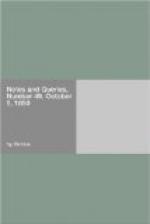In a letter from Mr. J.C. Walker to Mr. Pinkerton, of 19 Jan., 1799 (published in Pinkerton’s Literary Correspondence, vol. ii., p. 41.), Lord Charlemont is referred to as believing that Gaudentio di Lucca is founded in fact; that Bishop Berkeley, when he was at Cairo, conversed with persons who had attended a caravan, and that he learned from them what he narrated in the account of Gaudentio. This passage is cited in Southey’s Common-place Book, p. 204; but the work is manifestly fictitious, and it does not appear that Berkeley, though he twice visited the Continent, was ever out of Europe.
The date of the publication of Gaudentio is quite consistent with the authorship of Berkeley, who died in 1753; but the notice in the Gentleman’s Magazine only proves the existence of a rumour to that effect; and the authentic Life of Berkeley, by Dr. Stock, chiefly drawn up from materials communicated by Dr. R. Berkeley, brother to the Bishop, and prefixed to the collected edition of his work (2 vols. 4to. Lond., 1784), makes no allusion to Gaudentio. There is nothing in the contents of this work which renders it likely that the authorship should have been carefully concealed by Bp. Berkeley and his family, if he had really been the author. The literary execution of Gaudentio is good; and it is probable that the speculative character of the work, and the fact that Berkeley had visited Italy, suggested the idea that he had composed it. The belief that Bishop Berkeley was the author of Gaudentio di Lucca may therefore be considered as unauthorised.
The copy of the edition of Gaudentio of 1786, which is preserved in the British Museum, contains in the title-page the following note, in pencil:
“Written originally
in English by Dr. Swale of Huntingdon. See
Gent. Mag. 1786.”
The Gentleman’s Magazine for 1786 does not, however, contain any information about the authorship of Gaudentio; and the name of Dr. Swale appears to be unknown in literary history. At the same time, a positive entry of this sort, with respect to an obscure person, doubtless had some foundation. On the authority of this note, Dr. Swale is registered as the author of Gaudentio in the printed catalogue of the British Museum Library, whence it has passed into Watt’s Bibl. Brit. Perhaps some of your correspondents, who are connected with Huntingdon, may be able to throw some light on Dr. Swale.
Lastly, it should be added, that the writer of the article “Berkeley,” in the Biographic Universelle, adverts to the fact that Gaudentio di Lucca has been attributed to him: he proceeds, however, to say that—
“The author of a Life
of Berkeley affirms that Berkeley is not
the author of that book, which
he supposes to have been written
by a Catholic priest imprisoned
in the Tower of London.”
I have been unable to trace the origin of this statement; nor do I know what is the Life of Berkeley, to which the writer in the Biogr. Univ. refers. The Life published under the direction of his family makes no allusion to Gaudentio, or to the belief that it was composed by Bishop Berkeley.




